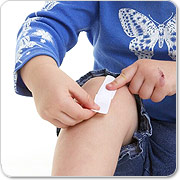Toddlers: Health

Toddlers seem to be constantly catching something. Colds, coughs, sniffles and even fevers are quite common.
Colds and other mild illnesses are part of growing up and there is not much a parent can do to avoid them. Fluids, comfort and rest are usually the best remedy. Keep an eye on your toddler and, if you are worried, there is no harm in asking a health care professional for advice.
Signs of serious illness
The signs of serious illness in a toddler are the same as for babies and can be found in the ‘nutshell’ guide to baby health. Illness can quickly worsen in a toddler, so always call your doctor if you are worried.
Common health issues
- Asthma. One in five Australian children suffer from asthma which sounds like a whistling wheeze when your child breathes out. An asthma attack can be very distressing for both child and parents. If you think your child has asthma, see your doctor about a management plan.
- Croup. This is caused by a virus and usually comes after a cold. Children with croup cough like a barking seal. Most cases of croup can be managed like a cold. You know your child best so, if you are worried, see your doctor.
- Chickenpox. This itchy virus causes red blisters on the body which children find impossible not to scratch. Once the chickenpox virus has run its course, it then stays dormant in the body and can return many years later as ‘shingles’. It is contagious, so you will need to keep her away from other children until the last blister has healed over. The easiest way to avoid chickenpox is to have your child immunised. Chickenpox vaccine is offered free at 18 months of age.
- Vomiting and diarrhoea are common in toddlers because they tend to put everything (including fingers) in their mouths. Offer her small amounts of clear fluid (water, oral dehydration fluid or flat lemonade diluted one-to-four with water if she won’t drink water alone) regularly until the problem passes. If you are worried that she is not getting better, ask your health care professional for advice. Find more about vomiting and diarrhoea.
- Bladder infection. Also called a urinary tract infection, this is more common in girls. You may notice she needs to wee more often and may be irritable or have a mild fever. For girls, wiping front to back will prevent most bladder infections. Treatment is with oral antibiotics so see your doctor.
See the A-Z Health Reference for other common health issues that may affect your toddler.
Health tips for toddlers
1. Make sure immunisations are up to date
Immunisation protects us against bacteria and viral nasties, such as measles and diphtheria, that are potentially serious and even life threatening. Immunisation is considered essential protection for your child. Toddlers can be immunised by a GP or at a baby health centre at:
- 12 months
- 18 months
- 24 months
The Maternity Immunisation Allowance is only payable once you have followed the immunisation recommendations.
2. Don’t give unprescribed medications
Normal household medicine can be deadly to toddlers. That’s why it is important not to give any medication to your child unless it is prescribed for her by your doctor. Some herbal remedies can also be dangerous, so it’s best to check with a doctor to be safe.
3. Keep her air clean
'Secondhand smoke’ can cause serious health risks to non-smokers. If someone in your house smokes, they can protect your child by always smoking outside. Avoid using chemical household sprays, like insect repellent or cleaning products, when your toddler is in the room.
Glossary:
Secondhand Smoke: Cigarette smoke inhaled by a non-smoker.